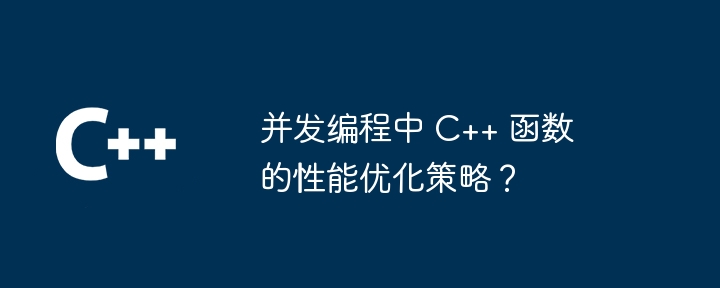
Strategies for optimizing the concurrency performance of C functions include: 1. Lock optimization (such as granularity optimization, lock type selection and acquisition order optimization); 2. Data structure selection (such as selecting thread-safe containers, focusing on performance characteristics and memory overhead); 3. Parallelization (such as using threads, task schedulers, and SIMD instructions); 4. Cache optimization (such as declaring local variables, using prefetching, and adjusting cache size).

C function concurrency optimization strategy
In concurrent programming, optimizing function performance is crucial and can improve the throughput of the application. volume and response time. For C functions, the following are some optimization strategies:
1. Lock optimization
Locks are the key mechanism for managing shared resources in concurrent programming. Improper lock usage can lead to deadlocks or performance bottlenecks.
2. Data structure selection
Selecting the correct concurrent data structure is crucial to optimizing function performance. Consider the following:
std::vector and std::map . 3. Parallelization
Performance can be improved by parallelizing the processing tasks of the function. Consider the following approach:
4. Cache optimization
Cache optimization can reduce memory access time and improve performance. Consider the following strategy:
Practical case
Optimizing an image processing function
Suppose we have an image processing function process_image(), which performs a series of transformations on the image. To optimize this function, we can take the following steps:
std::vector to store image data. By implementing these optimizations, we have significantly improved the performance of the process_image() function, allowing it to process image data faster and more efficiently.
The above is the detailed content of Performance optimization strategies for C++ functions in concurrent programming?. For more information, please follow other related articles on the PHP Chinese website!
 What are the differences between c++ and c language
What are the differences between c++ and c language
 Recommended learning order for c++ and python
Recommended learning order for c++ and python
 Cost-effectiveness analysis of learning python and c++
Cost-effectiveness analysis of learning python and c++
 Is c language the same as c++?
Is c language the same as c++?
 Which is better to learn first, c language or c++?
Which is better to learn first, c language or c++?
 The difference and connection between c language and c++
The difference and connection between c language and c++
 C++ software Chinese change tutorial
C++ software Chinese change tutorial
 Cost-effectiveness analysis of learning python, java and c++
Cost-effectiveness analysis of learning python, java and c++




